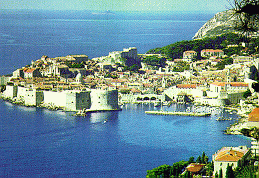


Since 1979, the old town of Dubrovnik is featured
on the World Heritage list. In 1991 it has been put
on the special list of the World Heritage in Danger.
Being a cultural centre, as well as the craddle of Croatian
sciences and arts, Dubrovnik represents a unique example
of well preserved urban complex, with a regular distribution
of streets and squares dating back to the periods of
Renaissance and Baroque. Although the discovery of the
oldest cathedral layer (7th-9th century) has revealed the
settlement's importance in early Middle Ages, the powerful
earthquake in 1667 came as a turning point in the city's
development. Dubrovnik ii characterized by functional
simplicity from the mighty defensive walls, being a visible
bulwark of its "sweet and precious freedom" in the words
of Dubrovnik's own Baroque poet Ivan Gundulic, that
became somewhat of the city's popular antheml, to the
seemingly modest Rector's Palace, reflecting moderation
and wisdom, the real Dubrovnik Republic defenders.
A network of consulates and trading stations all over Europe
and the world, as well as a mighty naval fleet, maintained
this little Republic in permanent contact with other nations
and other cultures. These contacts have enriched both
Dubrovniks and Croatian being, thus listing Dubrovnik
among the eternal examples of human spirit greatness that
no eartquakes or shells launched by demented conquerors
could ever harm. It is no wonder, then, that the First
European World Heritage Youth Forum (May 26-31, 1996)
should be taking place exactly here.